Living a minimalist life as a student can be transformative as it helps you stay focused, reduces stress, and enhances productivity. The minimalist lifestyle is all about simplicity and intentionality which make it way easier to manage academics and personal commitments. In this blog post, our team will explore tips on how to live a simple life as a student, from creating a minimalist study space to implementing habits that support a minimalist life.
From this article, you will learn:
- How to adopt minimalism and live a simple life
- Which aspects to focus on a student
- The main things to get rid of in a minimalist lifestyle
Discover how embracing minimalism can improve your well-being and set you up for success both inside and outside the classroom.
❓ What Is Minimalism?
More and more people are talking about minimalism and its benefits nowadays. But what is the true meaning of the concept? In essence, minimalism is the art of living a simple yet fulfilled life. It can help remove distracting clutter and allow you to concentrate on things that have value and purpose. You can look up essay samples on minimalism in our database, too. It will give you a better understanding of the concept and the way it’s applied in different spheres.
Minimalism can help students in the following ways:
- Save time. In the modern world, full of opportunities and various activities, it’s crucial to concentrate on the things that matter. Minimalism can help you remove distractions from your life, giving you more time to devote to essential tasks.
- Boost mental health. If your life is full of clutter, you may feel pressure or anxiety. Don’t be afraid to get rid of unnecessary stuff that distracts you. A clear living space = a clear mind!
- Spend less money. Do you really need that 15th t-shirt in your wardrobe? Or that pair of uncomfortable high-heel shoes you bought on sale? The answer is no! Here, everything is simplified – you don’t need things, you don’t purchase them, you don’t spend money on them.
- Engage in activities you enjoy. If you lead a minimalist lifestyle, you won’t feel like you have spread yourself too thin. You can do what you are passionate about, which will bring you much pleasure and inspiration.
- Take care of your physical health. If you clear your closet, schedule, and most importantly, your mind, your body will thank you! You’ll feel a burst of energy and motivation, and your general well-being will improve.
- Get rid of unnecessary stuff and thoughts. Why would you fill your living space and mind with things that don’t bring you any value? Follow the simple principle of minimalism: fewer things to care about = a more joyful life!
- Enjoy the moment. The simpler your life, the more positive emotions you experience. If your inner and outer environment is clear, you will be ready to enjoy every precious moment.
Try and adopt some of the principles of minimalism. Who knows, maybe your new lifestyle can lead you to what many people dream of:
- Personal growth and spiritual development.
- Satisfaction with your life and occupation.
- Identification of life goals and the active pursuit of them.
- The feeling of real freedom.
- More creativity, less consumerism.
📅 How to Adopt a Minimalist Lifestyle Step by Step
Minimalism can help every student feel free – whether it is a release from fears, excess junk, or depression. Following this philosophy’s principles will help you deal with your problems and eventually get rid of them.
So, how does it work?
In the sections below, we will introduce you to the basic principles of minimalism. By following them, you can gradually become released from all the useless and meaningless stuff in your life.
1. Eliminate unnecessary information.
Have you ever noticed that only 80% of curriculum study material appears in the exam? That’s why it is essential to keep track of what’s been highlighted in class and then focus on studying this specific area. Don’t try to memorize every single word from your textbook. It’s a waste of time! Concentrate on what matters. You will notice how doing so can improve your study experience and your grades.
2. Eliminate unnecessary things and junk.
Look around and analyze your environment. Are you sure you need all the things on your shelves and in your closets? If you haven’t touched the item in a year, you probably will not use it again. It’s time to get rid of the meaningless junk! Clear up your apartment and make space for positive vibes.
Feel like you are ready to start a new minimalistic lifestyle? Congrats! Now, you need to complete a crucial task – determine what things are unnecessary and what might be useful for you. This step is quite challenging.
Use the following as a guide:
- Analyze your environment. Evaluate whether you feel comfortable in it. If something annoys you, start cleaning.
- Remove junk from your room. Do you have a bunch of dirty mugs that need to be taken to the kitchen? Or old notebooks that you don’t use? Get rid of them. Do it now!
- Throw away useless trinkets. If you do not use something, seriously consider whether you need it.
- Evaluate each thing. Consider whether you can live without it. Is the answer yes? Feel free to get rid of it!
- Hide stuff that you can’t throw away. In case you’re unsure about getting rid of something memorable, put it in a box for a while. If you don’t need it, you may lose affection for it, and then it will be easier for you to throw it away.
For more advice and handy tips, we have compiled a list of essential items that every student must own. You can gradually get rid of many things, but these are must-haves:
Things for Bedroom
- Bed linen set. It must contain pillowcases, a bedsheet, and a duvet cover.
- Pillows. It’s better to have 2 of them – a soft one (to sleep on) and a hard one (to put it under the back while reading in bed).
- Blanket. This item is handy during the cold seasons to make your sleep comfortable.
Things for Kitchen
- Knife & chopping board. Make sure your knife is sharp and convenient; otherwise, it may cause you injuries.
- Saucepan. It should be of a regular size to boil pasta/buckwheat/rice.
- Frying pan. It’s better to buy a more expensive non-stick one – it will last longer, and your dishes will taste amazing!
- A set of containers. Buy several boxes of different sizes and keep prepped meals in the fridge in them. It’s very convenient.
- A set of cutleries. This must include forks, butter knives, tablespoons, and teaspoons.
- Bowl+plate+mug. This simple set of dishes will allow you to eat any kind of food.
Things for Study Area
- Laptop. It’s an essential device for any student to get access to materials and complete assignments.
- Smartphone. This gadget has unlimited capabilities that you’ll need for your studies as well (communication, Internet access, audio/video player, and a lot more).
- Earphones. It’s a useful item for those who share living space with somebody else.
- Desk lamp. This simple tool will take care of your eyesight ad make studying more comfortable.
Things for Bathroom
- Multitool. It can be, for example, 3 in 1 Trimmer, Shaver, Styler. If you buy one device that offers several options, you save your money and space in the bathroom.
- A set of towels. It’s better to have separate towels for your face, body, and feet because it’s hygienic.
- Toothbrush + toothpaste. Here, everything is obvious – do we even need to explain their importance?
- Hairbrush. Select one that perfectly fits your hair type, and your hairstyle will always look flawless.
- Nail scissors. Have sharp ones because nothing gives you more confidence than a neat manicure.
Clothes
In this section, you will find apparel items useful to you depending on the occasion or season. You can be the happy owner of these clothes and lead a fulfilled life.
While creating your minimalist wardrobe, pay attention to the following:
- Weather. First and foremost, analyze your living place. Are you from sunny Florida? Then, you don’t need heavy coats and wool scarves. Buy clothes that will be appropriate to the climate conditions of your country.
- Color palette. Decide on the colors you prefer the most and stick to this shades range while choosing clothes. The narrower the color palette you have, the more pieces of apparel you can combine.
- Fabrics. We highly recommend you to choose clothes made of natural materials, like linen or cotton. They are more pleasant to touch and higher in quality.
- Your lifestyle. Analyze your daily routine and think of possible ways to reflect your lifestyle through clothes. Choose apparel that perfectly suits your personality and occupation.
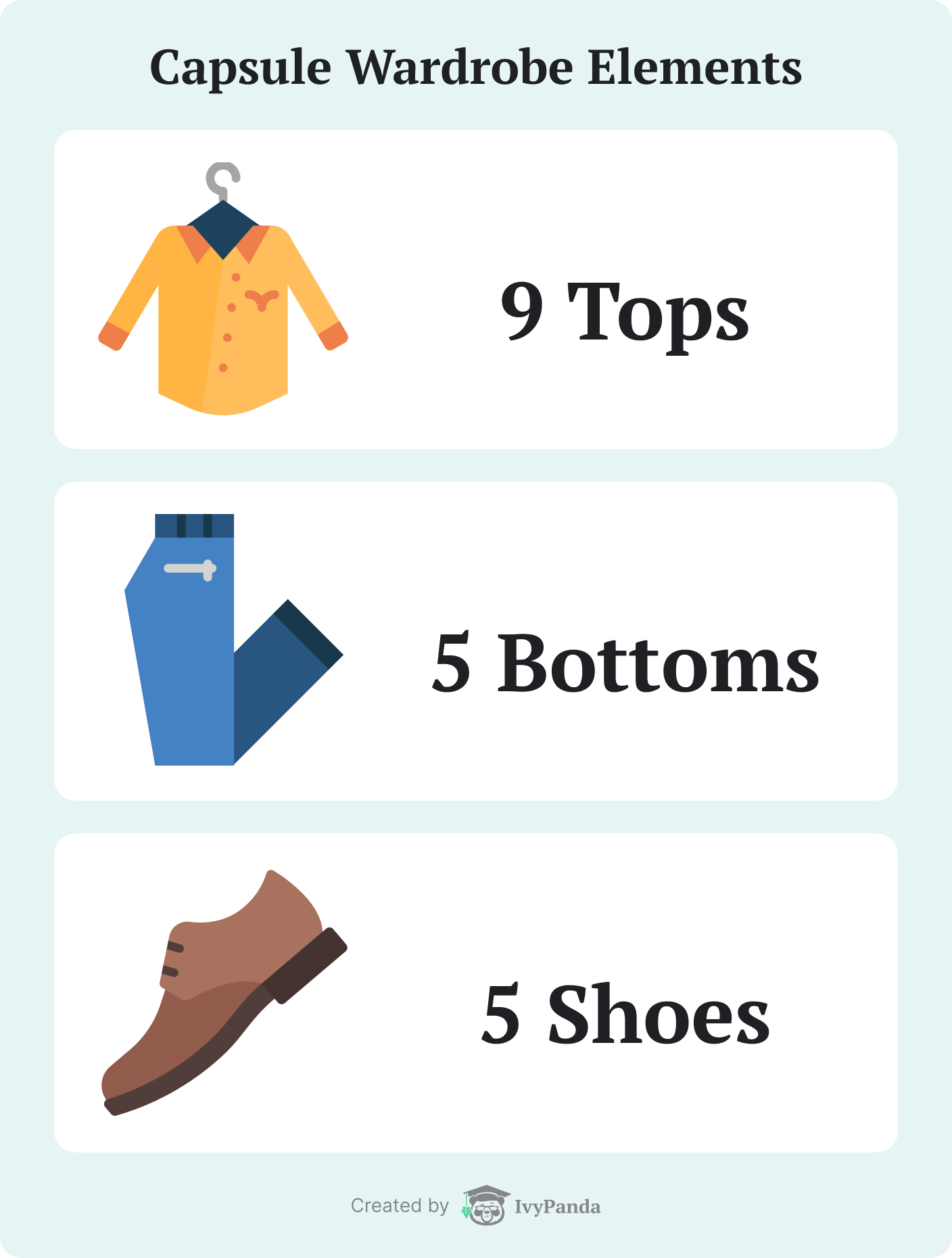
🙆 Get Your Priorities Straight
After you have got rid of unnecessary things, it’s time to understand what you need and what is important to you. Setting your priorities is necessary to achieve any goal and eliminate the remaining useless aspects of your life. Here, let’s talk about this in more detail.
Let’s figure out how to understand what you should leave in your life:
- List 5 essential things in your life.
- List 5 of your goals (in the beginning, limit yourself to 5 – you can add more later).
- List 5 things that take the most time.
- Analyze the second list by asking basic questions:
- Why are you spending so much time on each item?
- Do you only spend time on items from the first list? If not, why?
For instance, if you feel like you are spending too much time on the Internet, think about this behavior’s reasons.
- Consider if the items on the second list help you achieve your goals. Do they bring you closer to the essential things on the first list? If not, you should limit this aspect of your life.
While analyzing the lists, you must draw conclusions that will form the basis of your further plan of action.
For instance:
If you want to spend more time with your friends (list 1 or 2), but you spend too much time on social networks (list 3), you have to add this to your schedule. Take more walks, arrange meetings with friends – add activities that will lead you to something that pleases you.
As for social media, you should limit them. We’ll talk more about this in the next section.
📵 Limit Your Social Media
Anyone can benefit from learning how to limit social media and spend more time with people. It relieves the stress associated with the constant stream of news. Here, we will tell you how to achieve it.
Speaking about the influence of social networks, we should address its disadvantages:
- You tend to compare yourself to others more.
When scrolling through social media, you might observe other people’s achievements and their extraordinary lives. Watching everybody’s perfect online presence, you might find yourself comparing your life to theirs. That can lead to some negative consequences, like low self-esteem or increased anxiety. - Social media can affect your relationships.
If you’ve had dinner with someone, who spent the whole evening on the phone, you can understand how annoying that is. We fail at switching between tasks, getting distracted by something on the Internet. Unfortunately, that leads to arguments and eventual breakups. - Your sleep gets worse.
It is recommended that you don’t utilize your smartphone a couple of hours before going to bed. Such devices have a blue light that disrupts sleep. So, if you want to improve most aspects of your life, start with excluding your prone from your evening routine. - The use of a phone can severely damage your wrist and thumbs.
Overusing your wrist and thumbs can lead to numbness and pain. It’s not a big deal at first but can lead to injuries and other health issues. The best way to prevent it is to limit your phone use. - You can get lonelier.
As ironic as it is, social media is not that social. The more time you spend there and on the Internet in general, the lonelier you get. Social media cannot replace real-life communication. - Constant phone use can harm your eyesight.
Overusing your phone can lead to an eye-strain. Several tools can help you deal with the problem, like special glasses. Unfortunately, their effectiveness is not entirely clear yet. The best thing to do is to reduce the phone use time. - You’re distracted from what’s important.
Instead of enjoying and focusing on the present moment, you might be thinking about how to get a perfect photo. What’s worse, you might start to feel alive only online. The more time you spend on the phone, the more you miss out.
Therefore, even outside of minimalism, we recommend using less social media. But how?
These extensions and applications will help you restrict the use of social networks:
- StayFocused is an extension for Google Chrome that allows you to minimize your time on useless websites. Set a specific time limit, and websites will be blocked for the rest of the day.
- Cold Turkey is a website blocker that can do more than just block Facebook or Youtube. In case you need it, it might block applications, the whole Internet, or your computer.
- Limit is a Google Chrome extension that will allow you to limit your time on certain websites. For instance, you might restrict yourself to half an hour of Facebook per day.
- WasteNoTime is an extension available for Google Chrome and Safari. It can block websites and give you a report on what websites you spend the most time on.
- Pause is a browser extension that creates a gentle interruption when you visit a distracting website. As the distraction ends, it asks whether you want to proceed to the website. It allows you to reflect on whether you need to spend time there or not.
- FocusMe app can block websites that you spend a lot of time on. The significant difference from other similar tools is that it allows you to block websites forever.
- Forest application allows you to plant a seed and watch it grow. But, when you start using social media, the tree dies, and you have to start over.
- Self Control is available for iOS only. It lets you block websites or anything else on the Internet for a certain amount of time. It won’t disappear even if you restart the computer or delete an app.
☢️ Get Rid of Toxic People
We have already mentioned the need to free your schedule from unnecessary tasks and the room from useless things. Now, let’s discuss why it is crucial to eliminate your communication with toxic people.
Dealing with minimalism, we’re not just talking about physical objects. Limiting interactions with people with whom you feel uncomfortable or do not want to communicate is a critical part of this philosophy.
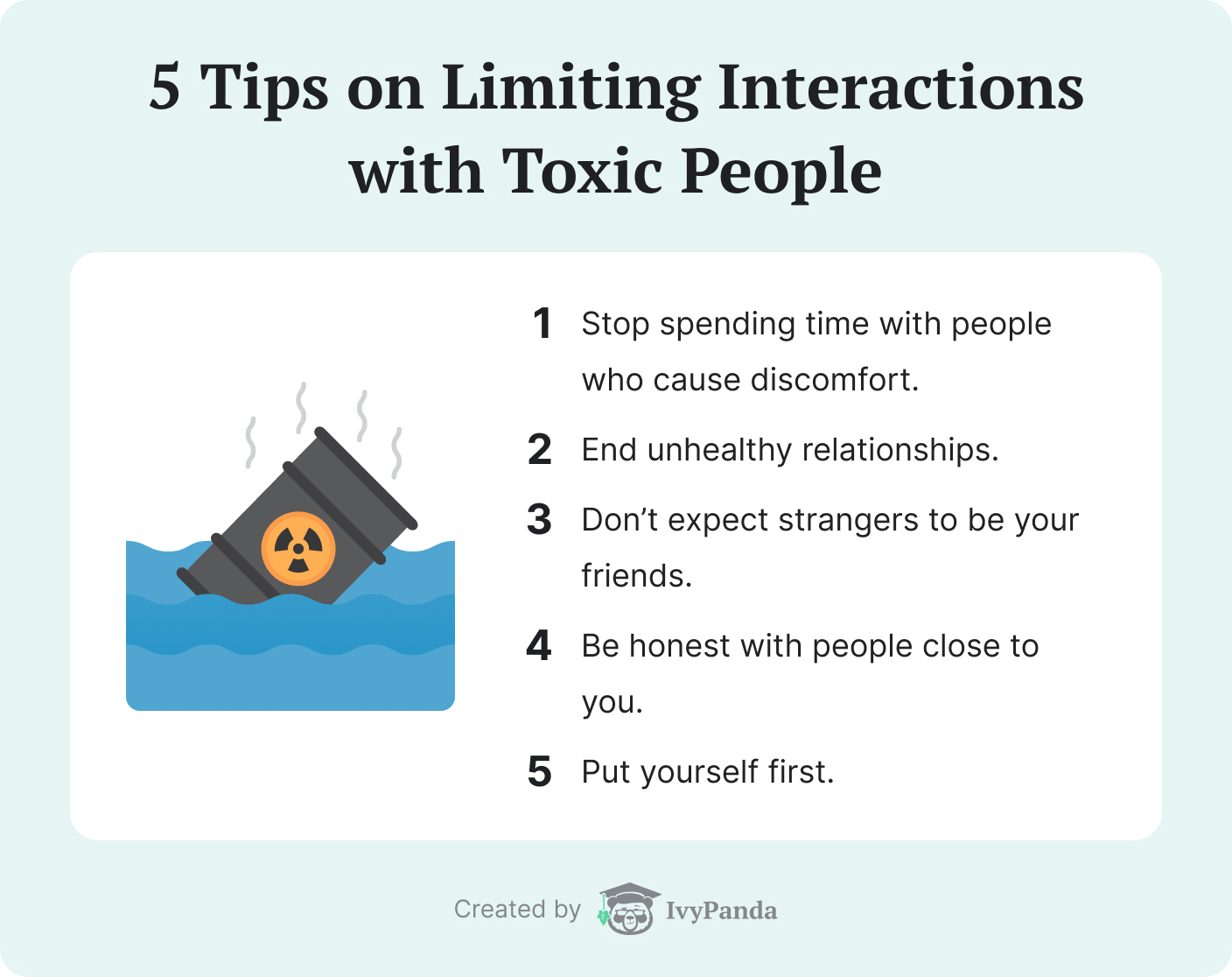
Following the tips above might be challenging. That’s why we prepared some recommendations on how to stop communicating with toxic people:
- Determine whether the person is toxic. Do you have manipulative and selfish friends who never apologize and always look for benefits from interactions with you? These are the features of toxicity. Consider limiting your interactions with such people.
- Realize that you can’t help it. Don’t try to change toxic people – it’s just a waste of your time and effort. Anyway, they will continue using you when it’s comfortable for them. So, you better just limit your interactions with them and stay aside.
- Set boundaries. Don’t get tempted to resume relationships with toxic people. If needed, block them on social media and delete their numbers. Set strict boundaries and stick to them, or toxicity will sneak into your private space.
- Understand when it’s done. Toxic people will try hard to get back to you. But don’t get manipulated by them. If you ended the relationship with a toxic person, don’t try to reestablish it – it’s not going to work out!
- Stay firm and confident in your decision. Be clear with your intentions, deliver them to a person directly, and don’t change your mind. If communication with an individual brings you anxiety, nothing should stop you from ending this relationship.
- Keep healthy relationships. Having eliminated all the toxic people from your life, save the relationships with those who indeed care about you. Maintain healthy interaction with the right people and feel inner harmony and outer happiness.
🙅♀️ Say NO to Dubious Offers
No doubts, it’s better to do a few things well than to complete a bunch of tasks poorly. This is another principle of minimalism that you should embrace. Wondering how to free yourself from unnecessary responsibilities that only litter your life? Learn the art of saying NO!
To refuse questionable offers and requests, you must understand three simple truths:
1. Saying NO is okay.
Remember that you are a mature adult, capable of making your own choices and decisions. If you don’t feel like a particular task will be pleasant and valuable for you, don’t agree on it. Saying “no” doesn’t make you a bad person. After all, you don’t need to take responsibility for everything in this life. When possible, perform only the activities that fulfill your inner state.
2. You should put yourself first.
Prioritize your own interests and don’t try to be helpful and friendly to everybody.
You’re not a one-hundred-dollar bill, not everyone is going to like you.
Meg Cabot
Decide on what’s indeed useful for you and refuse to complete unpleasant tasks. And stop worrying about random people’s opinions. Better care about yourself.
3. Not every offer is worth it.
No wonder you might desire to take every opportunity that your life offers you. But stop for a bit and analyze the situation:
- Is the challenge worth taking?
- Will it bring any value, joy, positive emotions?
- Will you feel encouraged or exhausted after you complete the task?
Evaluate all the pros and cons, and accept the offer only if it will benefit you. Or if it won’t cause you any harm at least. If you’re having trouble refusing an offer or request, try the following:
- Be direct with your NO. Don’t try to disguise your refusal or make it ambiguous.
- Practice saying NO. Try developing different scenarios in your head. Think of a more direct and tactic way to decline the offer.
- Don’t lie. All these fictional stories are likely to sound silly. It is always better to explain the real situation.
- Think about yourself first. Remember that refusing to complete a specific task doesn’t make you a selfish person.
- Don’t feel guilty. You don’t need to find any excuses for saying NO. It’s okay if you are declining an invitation simply because you don’t want to be engaged in some activity.
- Be polite. Refusing to an offer, don’t demonstrate your arrogance or rudeness.
💸 Think Before You Buy
Now that we figured out what to get rid of, it’s time to think about what to get. How do I buy things? Should I buy them at all? Let’s examine it in this section.
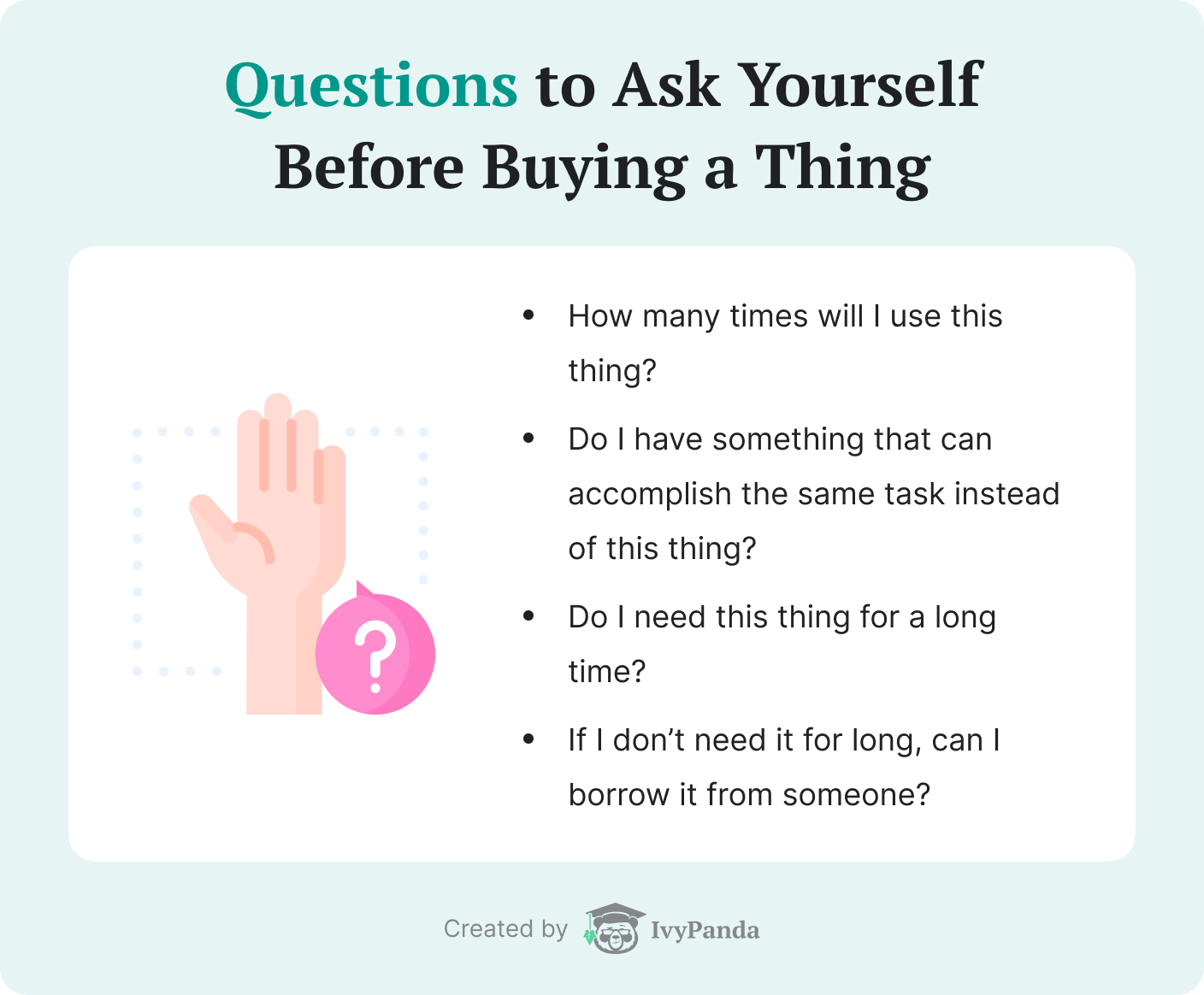
Often, these questions will help stop you from impulsive purchases and save you a lot of money. If you are sure that you need a thing, and all questions lead you to purchase, keep in mind:
- You should consider going digital when you can.
Going digital can completely replace several processes, such as writing down your notes. Some people don’t like working with modern technology. Those who do, benefit a lot from having all the necessary tools in one gadget. In any way, transitioning to devices in our technological age is crucial.
- If you decide to spend money on something, buy a high-quality item.
If you decide to purchase something, make sure to choose high-quality items. They tend to cost more than average products, yet it’ll worth it in the long run. If you’re about to buy a gadget or a piece of clothes, get an expensive one if it has all the qualities that you need. You will be able to use it for a long time and develop an appreciation for it.
All the recommendations we’ve listed lead to one conclusion – to become a minimalist, you have to manage your expenses. As a student, you should’ve noticed that it’s a vital part of being a responsible adult. Now it’s time to learn how to deal with your finances.
To manage your expenses, start with these steps:
- Open an Excel spreadsheet and write down all possible expenses. From your phone plan to your music service, write everything down. The spreadsheet will help you see the whole picture and analyze your finances effectively.
- Evaluate your expenses. You will quickly realize that you have a lot more bills than you thought and may want to cut some costs. Refer to your spreadsheets. That way, you will be able to compare the history of your expenses over time.
- Decide what you can save on. For example, you can hardly cut your rent or utility bills (although you can try to spend less water/electricity). But you can cook with friends instead of ordering pizza (and spend less money on it). Remove unnecessary spendings on take-out or new clothes. Focus on things that matter to you.
- Make your budget plan. To manage your expenses, you have to write down what bills you need to pay each month or week. Figure out what you can and cannot buy so that you’ll have enough money for the essentials. Refer to your budget plan at any time to understand what amount you can spend.
- Don’t forget about an emergency fund. You should save up even if there is nothing specific you wish to buy. Anything can happen, so it’s best always to be prepared to allocate a large sum for unexpected laptop breakdown. If you need something expensive, you can save for it separately from the emergency fund.
🔎 Focus on What’s Important
In the previous sections, you learned how to prioritize and ditch useless things. Here you’ll see how to focus on one task at a time with your full attention. This is the last and perhaps the most crucial principle of minimalism.
As a busy student, multitasking may seem like the best option for you. It creates the illusion that you are doing more at a time than doing everything in order. However, it is not. Therefore, you should free yourself from additional tasks and concentrate on one thing at a time.
How to focus on what’s important at the moment?
- Remove distractions from the surface. By clearing up the clutter on the table, you can completely change the level of concentration. While studying, leave what you’ll use over the next hour. You will most likely only need a couple of books, a pen, and paper.
- Remove electronics from the meetings. During meetings, you should concentrate only on the interlocutors, so you need to remove the distracting objects. If you’re meeting a friend, spend time with them instead of your phone.
- Plan your time accordingly. Determine how much time you can or should devote to each task and create a schedule (for a day or a week). Dedicate yourself to each assignment separately, without mixing them with anything.
- Always plan your resting time. For you to have the strength to concentrate, you need to rest well. To do this, plan your breaks and devote time to them without electronics and unnecessary noise. During moments of relaxation, you should focus only on yourself and your needs – perhaps, try meditation.
- Be present at the moment. Put away all the distractions, such as your devices and anxieties. Focus on the things that matter at the present moment. You cannot change the past, but the things you choose to do now can influence the future.
Thanks for reading the article! By becoming a minimalist student, you can completely change your life. We recommend taking a dip in this modern lifestyle and thinking about the benefits it can bring. Share this page with other students who might find it useful.
🔗 References
- When Less Is More: Minimalism and the Environment – Crisol Lopez Palafox, Barry University
- 10 Simple Ways to Manage Your Money Better – Latoya Irby, The Balance
- 21 Ways to “Give Good No” – Christine Carter, Greater Good
- To Multitask or Not to Multitask – USC Online, The University of Southern California
- How to Focus on What’s Important, Not Just What’s Urgent – Alice Boyes, Harvard Business Review
- 7 Useful Tips for Improving Your Mental Focus – Kendra Cherry, VeryWell Mind
- Minimalist Wardrobe Guide to Creating a Capsule Wardrobe – Minimalism Co
- Stop Scrolling: 4 Things You Should Be Doing on Social – Health & Wellness Services, University of Colorado Boulder
- 7 Ways to Get Organized for Online Class Success – UTEP Connect, The University of Texas at El Paso
- Creating a Spending Plan – Financial Aid & Scholarships, Berkeley, University of California
- The Impact of Social Media: Is it Irreplaceable? – Wharton School, the University of Pennsylvania
- Cutting Back Expenses: Managing Your Personal Finances in Tough Times – University of Wisconsin-Madison
- Can Money Buy Happiness? – Sarah Gervais, Department of Psychology, College of Arts and Sciences, the University of Nebraska-Lincoln
- 4 Techniques to Keep You Organized – Herzing University
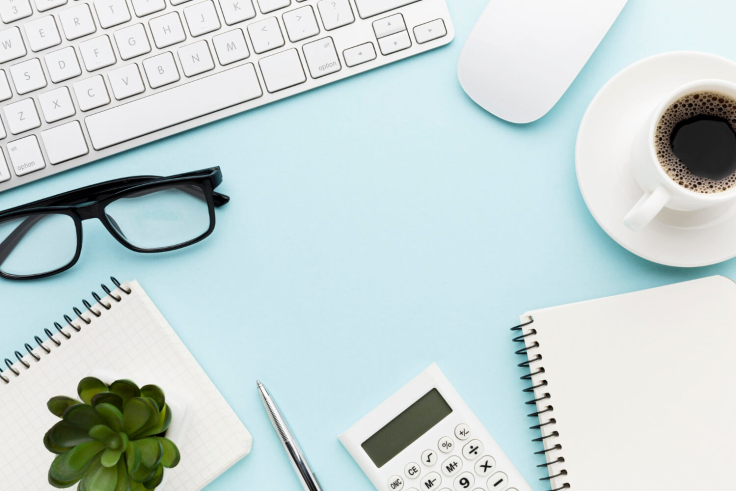

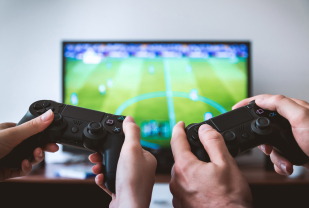
![How to Beat the Monday Blues [Ultimate Guide + Infographic]](https://ivypanda.com/blog/wp-content/uploads/2020/10/tired-black-woman-with-glasses-in-hand-rubbing-eyes-309x208.jpg)